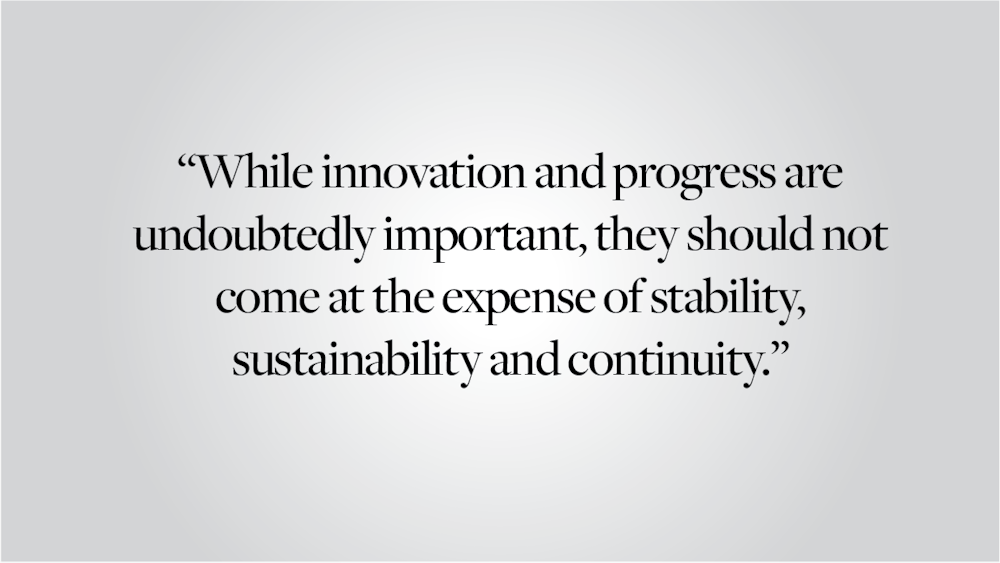In a fast-paced world, our generation’s obsession with the new is pervasive. From the latest smartphone to fleeting fashion trends, we have grown up in a society caught in an incessant cycle of novelty. This fixation with the new has become deeply ingrained in our culture, shaping our consumer behaviors, societal norms and even our sense of identity.
The shiny object syndrome describes how the prospect of a new purchase distracts us from our current possessions, leading to an endless addiction to consumption. But, this impossible hunt for novelty only provides dissatisfaction. In our relentless pursuit of the new and rejection of the familiar, we risk losing sight of the value of longevity. While innovation and progress are undoubtedly important, they should not come at the expense of stability, sustainability and continuity.
At the heart of this phenomenon lies rapid product cycles, in which goods and ideas are rapidly introduced, consumed and discarded in favor of the next big thing. The consumer market epitomizes this pursuit of novelty, with tech giants releasing new iterations of smartphones, laptops and gadgets at an alarming rate. Each upgrade promises enhanced features and capabilities, causing consumers to fear that they are missing out while rendering yesterday's models obsolete, all in the blink of an eye.
Similarly, the fashion industry, for example, operates under a model of planned obsolescence, churning out new collections at breakneck speed to capitalize on trends. Fast fashion has revolutionized the way we dress, offering affordable clothing that mimics the styles showcased on catwalks and social media feeds. But, this disposable approach to fashion comes at a steep cost, both environmentally and ethically, by bolstering overconsumption and waste. Again, marketers take advantage of our short-term attention, allowing us to neglect the warnings of long-term climate threats.
Our obsession with the new extends beyond material possessions. Cancel culture also thrives on the constant search for the latest scandal or controversy, as social media users eagerly jump from one outrage to the next. One day, a public figure is adored and cheered on by millions of fans. The next day, a tabloid blasts a negative rumor and they boo louder than they ever cheered. Cancel culture illuminates how obsession is only appealing to the consumer’s mindset when it is new and shiny. Although more accountability for public figures can be beneficial, community sentiment must critically discern when and how it can wield its influence for good.
In the realm of politics, short product cycles are evident in the rise of charismatic candidates who capture the public's imagination with bold promises and unconventional tactics designed to win votes. Elections have become battlegrounds of spectacle and sensation, where substance is often overshadowed by style, and long-term vision is sacrificed for immediate gratification. Donald Trump’s political career demonstrates how an outsider can disrupt Capitol Hill norms by appealing to extremism, targeted but memorable language, and a campaign built on rhetoric over substance.
The rise of short-form media platforms like TikTok has further accelerated our obsession with the new, offering a constant stream of bite-sized content designed to capture our attention. Flashy captions and click-bait have so much influence on American public opinion. Consequently, the consumer becomes flippant because tomorrow’s content may change their viewpoint entirely with little consequence. When media circulates on the basis of short-term entertainment and instant gratification instead of relevance and accuracy, misinformation spreads for the sake of profit.
For college students, the shiny object syndrome can look like doom-scrolling as a stress coping mechanism, seeking out extreme experiences by partying and using substances, or letting tangents distract from a research objective in a paper. With our busy lives at Brown, it can be hard to resist the temptation for something new and exciting to combat daily monotony. But, we must try to remind ourselves not to fall into this trap, because our lives’ meanings should be grounded in valuable, sustained experiences. The real world is made up of our friends, family, a beautiful campus and wonderful professors, all waiting to be cherished. Happiness may not be about the next dopamine hit, but maybe about the comfort of friendship, well worn habits, or that reliable cup of coffee. Without the familiar, we may spend our lives lost in an endless chase for something better, when we are surrounded by people and things that are already worth coming back to.





